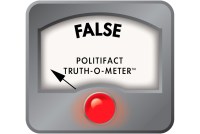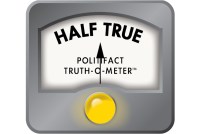Latest KFF Health News Stories
Trump Says He’ll Stop Health Care Fraudsters. Last Time, He Let Them Walk.
In his first term, President Donald Trump granted pardons or clemency to more than 60 convicted fraudsters, including health care executives who defrauded Medicare out of hundreds of millions of dollars, courts and juries found. Now, Trump says cracking down on fraud is a priority.
With Few Dentists and Fluoride Under Siege, Rural America Risks New Surge of Tooth Decay
The anti-fluoride movement has more momentum than ever. In rural counties with few dentists, tooth decay could surge to levels that have not been seen in decades, experts warn.
Decenas de comunidades han decidido dejar de fluorar su agua en los últimos meses. Eso, sumado a la escasez de dentistas, puede crear una tormenta perfecta para las caries, dicen expertos.
Montana Examines Ways To Ease Health Care Workforce Shortages
Bills before the legislature would license community health workers and make it easier for some other health professionals licensed in other states to do business in Montana.
‘I Am Going Through Hell’: Job Loss, Mental Health, and the Fate of Federal Workers
Since the Trump administration began firing federal workers, they say they feel overwhelmed, have obtained or considered seeking psychiatric care and medication, and are anxious about paying their bills. And soon, their health insurance will run out.
Many People With Disabilities Risk Losing Their Medicaid if They Work Too Much
As politicians demand that more Medicaid recipients work, many people with disabilities say their state programs’ income and asset caps force them to limit their work hours or turn down promotions.
Bill That Congressman Says Protects Medicaid Doesn’t — And Would Likely Require Cutting It
U.S. Rep. Nick LaLota, a Long Island Republican, told his constituents that he voted for the House-passed GOP budget resolution because it protects Medicaid, Medicare, and Social Security. However, the bill charges a committee with making cuts that likely can’t be attained without slashing Medicaid.
Journalists Demystify Bird Flu, Medicaid Work Requirements, and Reproductive Health Research
KFF Health News journalists made the rounds on national and local media recently to discuss topical stories. Here’s a collection of their appearances.
Medicaid Cuts Would Kneecap Health Services, Tribal Leaders Warn
Get our weekly newsletter, The Week in Brief, featuring a roundup of our original coverage, Fridays at 2 p.m. ET.
Tribal Health Leaders Say Medicaid Cuts Would Decimate Health Programs
As Congress mulls significant cuts to Medicaid, Native American tribes are bracing for potentially devastating financial fallout. That’s because Medicaid is the largest third-party payer for Native American health programs, funding that has helped address chronic underfunding of the Indian Health Service.
Congressman Blames Trump Team for Ending Telehealth Medicare Benefit. Not Quite Right.
Rep. Ro Khanna of California warned of Trump administration “cuts” to Medicare telehealth access hitting March 31. But if Medicare recipients lose telemedicine benefits that day, it will be because Congress failed to act.
Checking the Facts on Medicaid Use by Latinos
Republicans’ moves to scale back Medicaid are leading to more misinformation about immigrants, especially Latinos, circulating on social media platforms. The misconceptions include the myths that Latinos covered by Medicaid don’t work and that they use Medicaid significantly more than others.
Verificando cinco mitos sobre los latinos y Medicaid
Los recortes de gastos, la inmigración y Medicaid están bien arriba en la lista de prioridades en la agenda de Washington. Este clima politico ofrece un terreno fértil para que la desinformación y los mitos se multipliquen en las redes sociales.
Watch: The Dr. Oz Show Comes to Congress
The Senate Finance Committee questioned Mehmet Oz, President Donald Trump’s nominee to lead the Centers for Medicare & Medicaid Services. KFF Health News reporters discussed the biggest takeaways from the hearing.
Journalists Share How Additives Enter Food Supply and Measles Harms Kids’ Immune Systems
KFF Health News journalists made the rounds on national and local media recently to discuss topical stories. Here’s a collection of their appearances.
What the Health? From KFF Health News: The Cutting Continues
The Trump administration’s efforts to downsize the federal government continue, with both personnel and programs being cut at the Department of Health and Human Services, the Department of Veterans Affairs, and the Social Security Administration. Meanwhile, the fight over cuts to the Medicaid program for those with low incomes heats up, as Republicans worry that more of their voters than ever before are Medicaid beneficiaries. Alice Miranda Ollstein of Politico, Shefali Luthra of The 19th, and Anna Edney of Bloomberg News join KFF Health News’ Julie Rovner to discuss these stories and more. Also this week, Rovner interviews Jeff Grant, who recently retired from the Centers for Medicare and Medicaid Services after 41 years in government service.
California Borrows $3.4 Billion for Medicaid Overrun as Congress Eyes Steep Cuts
Medi-Cal, California’s Medicaid program, borrowed $3.4 billion from the state — and will likely need even more — due to higher prescription costs and increased eligibility for seniors and immigrants. The top Republican in the state Senate is demanding a hearing “so the public knows exactly where their tax dollars are going.”
Can House Republicans Cut $880 Billion Without Slashing Medicaid? It’s Likely Impossible.
A Republican House resolution, which needs the Senate’s buy-in, directed a committee to propose ways to reduce the deficit by at least $880 billion over a decade. Lawmakers have taken Medicare off the table for cuts, which makes it impossible to reach $880 billion without cutting Medicaid.
In Trump’s Team, Supplement Fans Find Kindred Spirits in Search of Better Health
President Donald Trump’s health team has deep financial ties to the supplements industry. Now they’re poised to boost its growth and remake the government’s approach to health.
Sent Home To Heal, Patients Avoid Wait for Rehab Home Beds
Many patients ready to leave the hospital end up lingering for days or weeks — occupying beds that others need and driving up costs — because of a lack of open spots at nursing homes and rehabilitation facilities. A few health systems are addressing this problem by moving post-acute rehab into the home.























